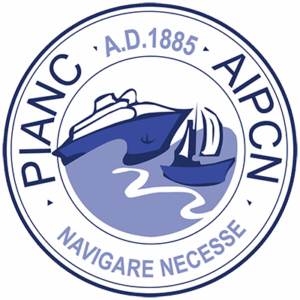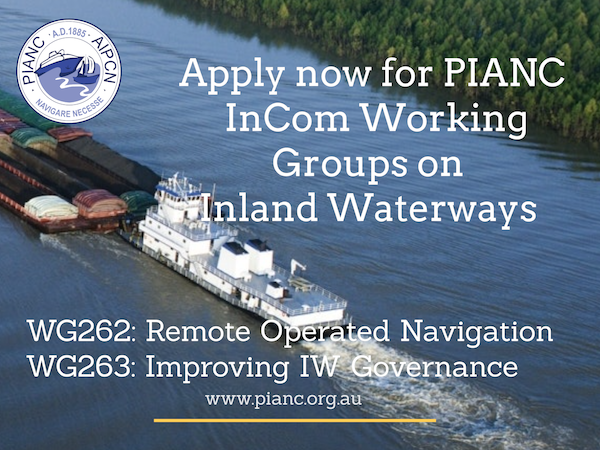PIANC International Call for members for InCom WG262 & WG263
Apply to PIANC AU-NZ Board by COB Friday 13 December. (see below for details)
1) Objectives of WG 262: Remote Operated Inland Waterways Navigation.
Remote operated navigation in inland waterways represents a cutting-edge frontier, leveraging advancements in remote sensing, real-time data transmission, and automated systems.
The technology to steer a vessel (ROC) remotely seems to be ready for broader implementation in the sector, with promising prospects for improved operational efficiency and safety. However, to effectively and responsibly integrate these technologies, a solid legal framework is crucial. This framework must provide clear guidelines and standards that regulate not only the technical aspects but also address the ethical and safety issues associated with remote systems as well as explore the legal implications.
Note that this WG will only target the remote IW navigation and not the semi-autonomous and autonomous navigation systems.
More information is here in the WG262 Terms of Reference.
2)Objectives of WG 263: Key Elements and Best Practices to Improve the Governance of Inland Waterways.
The first objective of the WG is to discuss and compare the management practices of waterway infrastructures in different countries and regions around the world: different forms of inland waterway infrastructure, respective practices and measures adopted.
The WG will seek to conduct a comparative analysis to understand how different countries, regions, or groups of countries manage their waterways in relation to the key elements of governance. This analysis will assess specific elements adopted, whether they are recurrent or occasional and other relevant nuances.
The WG aims at identifying and categorizing patterns of governance and finding out possible standards for each type of IW structure. The WG report will frame the current technical vision of PIANC on the governance/ management of waterway transportation, specifically listing the practices considered essential for setting up a management program.
It should be noted that the practices of each country reflect the perceived scale of its waterway infrastructure. Thus, the aim is not to criticize any particular model, but to provide a framework for the development of waterway management projects for those that are considered themselves as incipient or for the improvement of existing programs. The output should be useful in formulating new waterway policies, helping governments and managers change existing practices, or welcoming different ways of dealing with the waterway system.
More information is here in the WG263 Terms of Reference.
Interested in being part of an International Working Group?
If you would like to represent the Australian & New Zealand National Section of PIANC on this Working Group, please apply to the AU-NZ Board. Many of our members are currently active on a number of PIANC Working Groups and they produce significant outcomes that benefit maritime matters in our region. They also bring significant benefits to participants who get to meet, learn from and share with global experts.
Please advise if you qualify as a Young Professional (YP – 40 years or younger) as there are two positions available in each Working Group, one of which is for a YP.
How to Apply
Please forward your application/s before COB Friday 13 December 2024 to:
Apply to Greg Britton, (Technical Commission Lead AU-NZ) E: greg.britton@rhdhv.com, and please also cc Paul Weston, EO for PIANC AU-NZ E: Paul.weston@pianc.org.au
Process for Applications
Your application should include a detailed CV/Resume with a short covering letter outlining:
1. Your experience in the particular technical field;
2. Why the WG is relevant for the Australian / NZ content and the direct benefits of participation;
3. A commitment that you will prepare (for distribution to all members) a short report providing an overview & outcomes of the WG etc;
4. Whether or not you are seeking to access Travel Assistance Policy (TAP )funding; and
5. Whether you qualify as a Young Professional.
Eligibility:
Please note that Working Group Members need to be Individual Members of PIANC, working for a Corporate Member or Platinum Partner, be an invited expert or a be a member of a Sister Organisation.
Process:
A Selection Committee will review all nominations received and make a final recommendation to the PIANC AU-NZ Chair.
Responsibilities:
Please be aware that membership of a Working Group does require your active participation. This includes attending Working Group meetings (pre-Covid -19 this was usually at international locations) or as a ‘Corresponding Member’ if you do not want to undertake the normal travel requirements of full membership. If you are expert in the field and would like to influence the outcome of the Working Group we encourage you to participate as fully as you are able.
Costs:
All costs associated with membership must be borne by either yourself or your employer, however PIANC Australia & New Zealand has a Travel Assistance Policy to partially assist with travel & attendance at Working Group meetings, in order to promote Australian and New Zealand technical input into these important WG activities.
Under the PIANC AU-NZ Travel Assistance Policy (TAP), up to $2,000 funds may be payable post travel upon the successful completion of a WG Summary Report and production of relevant travel receipts.

